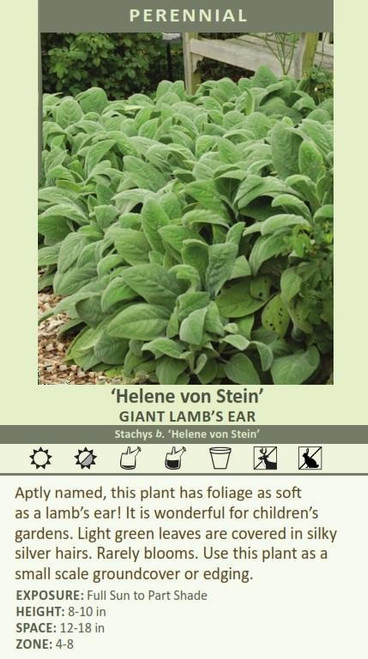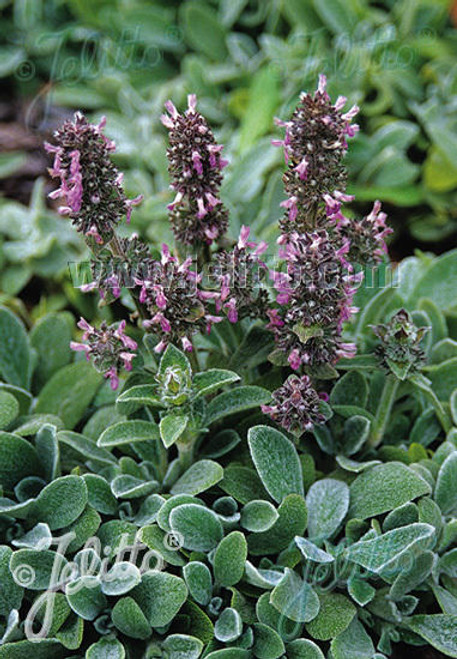Product Description
Stachys byzantine 'Helene von Stein' ('Big Ears') (4) 1-gallons
Common name: Lamb's Ear-Giant.
Zone 4 to 8.
Full sun to part shade.
Plants reach 8 to 10 inches tall and 12 to 18 inches wide,
clump-forming herbaceous perennial.
Growth rate: Moderate.
Stachys byzantina 'Helene von Stein' is a cultivar of Lamb's Ears that stands out for its extra-large, velvety leaves and impressive size. It is a wonderful addition to gardens, offering a bold textural element and a striking silvery presence.
- Foliage: The most notable feature is its large, tongue-shaped leaves covered in a thick layer of silky, silvery-gray hairs. The leaves of 'Helene von Stein' are significantly larger than those of the standard Lamb's Ears, growing up to 12 inches long. This creates a bold, eye-catching texture in the garden.
- Flowers: It rarely produces flower spikes, and when it does, the flowers are small and insignificant compared to the impressive foliage. Many gardeners prefer to remove the flower stalks to maintain the focus on the silvery leaves.
- Growth Habit: It forms a robust, spreading clump that typically grows 10-12 inches tall and 18-24 inches wide. It spreads by creeping stems, making it an effective groundcover.
- Hardiness: It is hardy in USDA zones 4-8, tolerating a wide range of temperatures and conditions.
- Low Maintenance: Once established, it is very low-maintenance and drought-tolerant.
Growing Conditions:
- Sunlight: It thrives in full sun to partial shade. Full sun promotes denser growth and better foliage color.
- Soil: It prefers well-drained soil and tolerates various soil types, including sandy, loamy, and clay soils.
- Moisture: It prefers moderate moisture but is drought-tolerant once established. Avoid overwatering, which can lead to root rot.
Uses in the Landscape:
- Groundcover: Its spreading habit and large leaves make it ideal for covering ground, suppressing weeds, and creating a dramatic silvery carpet.
- Borders and Edging: It provides a bold textural contrast to other plants in borders and edges.
- Rock Gardens: It thrives in the well-drained conditions of rock gardens, softening the hard edges of rocks.
- Sensory Gardens: Its soft, velvety texture makes it a delightful addition to sensory gardens.
- Containers: It can be used in containers as a spiller or filler, adding texture and interest.
Additional Tips:
- Pruning: Remove any dead or damaged leaves to maintain a tidy appearance. Flower stalks can be removed if desired.
- Division: It can be divided in spring or fall to propagate new plants or maintain plant vigor.
- Deer and Rabbit Resistance: It is generally deer and rabbit resistant due to its fuzzy foliage.
- Overwatering: Avoid overwatering, as this can lead to root rot and fungal diseases.
Overall, Stachys byzantina 'Helene von Stein' is a fantastic choice for gardeners seeking a bold, textural groundcover with stunning silvery foliage. Its large leaves, compact growth habit, and low-maintenance nature make it a versatile and attractive addition to various garden settings.
This genus contains many members with foliage and plant habits completely different from the common gray-leafed (and somewhat invasive) Lamb's Ears.
(4) 1-gallon containers ready to plant, plants may be trimmed for shipping,
Other Details
The most important part of the plant is its root system. Healthy roots are the foundation of a healthy, vibrant plant. The type of plug container used is based on the specific needs of the plants. Perennials offered as bare root traditionally perform better when planted as bare root.Planted in a specialized mix, potted plants have well established root systems. Top growth stage will vary depending on the current life cycle and time of year when shipped. In Winter and early Spring dormant plants may be shipped. Dormant plants may be planted right away, even before the last frost date.
Most bare root varieties are field grown for at least one season, though Hemerocallis and Hosta are grown for two seasons. The bulk of the soil is removed during the harvesting process and the tops of most varieties are trimmed back to the crown. They are graded, packed in shredded aspen or sphagnum moss and stored in freezers until ready to be shipped.
See our Container Sizes and Bare Root Perennials pages for more information.
Plant information and care is provided in the Overview section, Plant Genus Page and general information is provided in the Planting Care & Guides. Additional questions can be asked on each Plant page.
Plant Spacing: Using the maximum mature spread or width of a plant to guide spacing, ensures space to grow to full size. To fill an area sooner, plant them closer together. Just remember, future thinning or transplanting may be needed.
Water: Keep a close eye on newly planted perennials, especially throughout the first growing year. Most early plant loss is due to too much or too little water!













